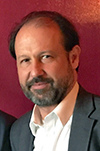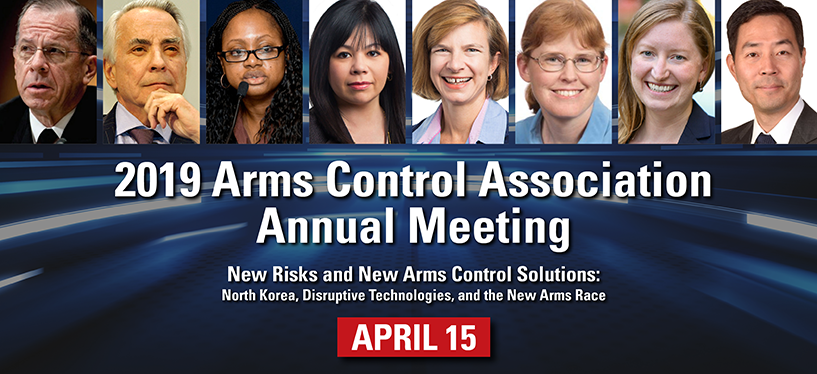Proven nuclear arms control treaties are at risk. Talks between Washington and Pyongyang are stalled. The machinery of disarmament diplomacy has nearly ground to a halt. Global arms competition between the world’s major nuclear actors is on the rise.
Not since the difficult Cold War years has the risk of a nuclear conflict been so high—and a more informed and saner debate about nuclear risk reduction and disarmament been so important.
But with focused effort—and a well-informed and more engaged public—we can find solutions to weapons-related problems we see in the headlines each week.
As our good friend Lawrence Weiler, a pioneering diplomat and negotiator who passed away in February at the age of 98, wrote last summer:
“Even during the dark days of the Cold War, when it didn't seem like things were possible, we persisted. American and Soviet negotiators engaged with one another in an effort to reduce nuclear risks. If we could do it then, we can also find practical ways to tackle today’s tough nuclear challenges.”
Though the path forward may not be clear, he is right. There is a path forward.
Larry—who served in six different presidential administrations; was involved in negotiating the 1963 Hotline Agreement and Limited Test Ban Treaty, the 1968 nuclear Nonproliferation Treaty, the Anti-Ballistic Missile Treaty, and the Strategic Arms Limitation Talks; and was long-time member and friend of the Arms Control Association—would have insisted that we persist until we find the pathways toward a safer world.
Thank you for your support,
 Daryl G. Kimball,
Daryl G. Kimball,
Executive Director
Admiral Mike Mullen, Others to Address 2019 Annual Meeting
We're excited to announce the speakers for the program for our April 15 Annual Meeting on “New Risks and New Arms Control Solutions” at the Washington Court Hotel on Monday, April 15 in Washington, D.C.!
The day-long conference will address North Korea, disruptive weapons technologies, gender diversity in the nuclear policy field, and strategies to avert a new nuclear arms race.
Our keynote speaker will be Admiral Mike Mullen (ret.), the Chairman of the Joint Chiefs of Staff from 2007-2011. He will address the role of nuclear arms control and diplomacy in advancing U.S. security.
The conference will bring together other top experts and policymakers for in-depth discussions of today’s difficult, weapons-related security challenges:
- Amb. Richard Burt, former Reagan administration arms control negotiator, and Joan Rohlfing, Chief Operating Officer with the Nuclear Threat Initiative, on “Addressing the Crisis in U.S.-Russian Arms Control;”
- Heather Hurlburt, director of the New Models of Policy Change at New America, and Amb. Bonnie Jenkins, founder of Women of Color Advancing Peace, Security, and Conflict Transformation, on “Breaking Barriers to Gender Inclusivity in the Nuclear Policy Field;”
- Bonnie Docherty, senior researcher at Human Rights Watch, and Erin Dumbacher, program officer for the Scientific and Technical Affairs at the Nuclear Threat Initiative, on “The Challenges of New Weapons Technologies and Strategic Stability;”
- Suzanne DiMaggio, senior fellow at Carnegie Endowment for International Peace, and Frank Aum, senior expert on North Korea at the U.S. Institute of Peace, on “Next Steps Toward Denuclearization and Peace on the Korean Peninsula,” and more.
Annual Meeting registrants are invited to join us for a reception with Senator Chris Van Hollen of Maryland at 4:00 pm following the conference.
Register today at https://www.armscontrol.org/armscontrol2019
The INF Treaty is in Jeopardy. New START Could Be Next.
The Arms Control Association team continues to work overtime to prevent a dangerous new Euromissile race in the wake of the likely termination of the landmark 1987 INF Treaty. In response to the Trump administration’s announcement that it would begin to test new ground-launched cruise missiles prohibited by the treaty as soon as August, Executive Director Daryl Kimball told The Wall Street Journal:
“There is no military need, nor is it politically wise to rush headlong into a new intermediate-range missile race with Russia. Rather, Washington and NATO need a new arms control plan that heads off a dangerous action-reaction cycle.”
We are also rallying support for the extension of the 2010 New START agreement. On March 13 in Washington, we convened a group of 40 top experts and former officials for a closed-door workshop to assess the situation and to develop realistic strategies to encourage the extension of New START before its scheduled expiration date in 2021.
Kimball will travel to Moscow for further consultations with American and Russian experts and with senior Russian government officials to press for a professional and sober-minded U.S.-Russian dialogue on extending the treaty, without which there would be no legally-binding limits on the world’s two largest nuclear arsenals for the first time since 1972.
Association staff will also be at the UN in New York for the next Preparatory Committee meeting ahead of the 2020 NPT Review Conference. We’ll provide regular updates on the proceedings and will organize the NGO presentation to the conference on the importance of New START to the fulfillment of the nuclear weapon states' NPT obligations to end the arms race and pursue nuclear disarmament.
For regular updates on developments, see the next issue of Arms Control Today and sign-up for our new e-newsletter, The U.S.-Russian Nuclear Arms Control Watch.
Senior Fellow Jeff Abramson Targets Proposed Firearms Transfer Proposal
On March 5, the Arms Control Association and senior fellow Jeff Abramson, working with the Forum on the Arms Trade, hosted a press teleconference with Representatives Norma Torres (D-Calif.) and James McGovern (D-Mass.), Kris Brown with the Brady Campaign, Kristen Rand at the Violence Policy Center, and John Lindsay-Poland of the Project to Stop U.S. Arms to Mexico.
Journalists from 15 organizations joined the call to hear concerns about the administration's proposal to transfer export oversight of semi-automatic firearms and select other weapons from the State Department to the Commerce Department.
Abramson reported on the issue in the latest edition of Arms Control Today and released a statement in February on the proposal.
Abramson has been invited to testify March 26 on the issue before the House Foreign Affairs Subcommittee on Investigations and Oversight.
Prospects for North Korea Talks Cloudy
Unfortunately, the second summit between U.S. President Donald Trump and North Korean leader Kim Jong Un in Hanoi in February failed to produce meaningful results. Trump and Kim still do not have even a basic roadmap on the sequence of steps needed to move closer toward the long-term goal of denuclearization and peace. There is no clarity about follow-up meetings by their respective foreign ministers or envoys.
As our Nonproliferation Policy Director Kelsey Davenport wrote in NK News:
“The Hanoi outcome is a setback to U.S-North Korean negotiations, but not a complete surprise nor a death blow to diplomacy. Going into the summit there were clearly gaps between the U.S. and North Korean positions on a deal trading dismantlement of Yongbyon for sanctions relief and not enough time to resolve them.”
Davenport says that the talks must now transition “from the head-of-state level to a working-group led process that empowers the negotiating teams to pick up where Trump and Kim left off and reach agreement on next steps.”
Kelsey will moderate an expert panel on the next steps at our 2019 Arms Control Association Annual Meeting.
On Our Calendar
| March 14-16 | Board Chair Tom Countryman traveled to Annecy France for Center on Nonproliferation Studies NPT Diplomatic Workshop |
| April | The release of the new Arms Control Association reports on “U.S. Nuclear Weapons Excess” and the “Nuclear Nonproliferation and Disarmament Report Card, 2017-2019.” |
| April 9-11 | Executive Director Daryl Kimball travels to Moscow for a Track 1.5 Meeting on Addressing the Crisis in U.S. and Russian Nuclear Arms Control |
| April 15 | Arms Control Association 2019 Annual Meeting, Washington Court Hotel, Washington, D.C. Register online. |
| April 29-May 10 | Alicia Sanders-Zakre and Daryl Kimball attend and monitor the NPT Preparatory Committee Meeting for 2020 Review Conference. |
ACA In the News
- Executive Director Daryl Kimball reminded Beyond the Bomb, University of Washington Chapter members that “You don’t have to be a nuclear policy wonk to be smart about nuclear weapons policy,” March 16.
- Kingston Reif, director for disarmament and threat reduction policy, cautioned that “[U.S.] deployment of interceptors in space would be a disaster for strategic stability,” in Defense One, March 14.
- Kelsey Davenport, director for nonproliferation policy, was featured as a leading voice of the new generation on nuclear disarmament, in Crux, March 13.
- Daryl Kimball responds to the Pentagon’s plan to develop and test new intermediate-range missiles prohibited by the INF Treaty in the Wall Street Journal and the Associated Press, March 13.
- Research Assistant Alicia Sanders-Zakre proposed how to get U.S.-North Korea diplomacy back on track after the Hanoi summit in The National Interest, March 12.
- Board Chair Thomas Countryman unpacked the U.S.-North Korean summit outcome and future prospects for diplomacy on C-SPAN's Washington Journal, March 3.
- Daryl Kimball returned to C-SPAN's Washington Journal to examine potential steps for effective U.S.-North Korean diplomacy just prior to the Hanoi Summit, Feb. 19.

